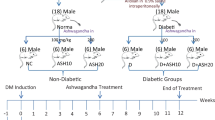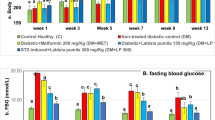Abstract
Background
Cucurbita pepo (C. pepo) is cultivated and used traditionally as vegetable as well as medicine in different parts of the world. The aim of current study was to investigate the potential of C. pepo in attenuation of diabetic neuropathy via using streptozotocin (STZ)-induced diabetes model in male wistar rats.
Materials and Methods
Diabetic neuropathy was induced by administration of STZ; 65 mg/kg, i.p. and Nicotinamide (NAD; 230 mg/kg i.p.) and assessed by measuring thermal hyperalgesia, mechanical hyperalgesia and motor nerve conduction velocity (MNCV) in experimental animals. Treatment with different doses of (100, 200 and 400 mg/kg, p.o.) petroleum ether extract of C. pepo (CPE) and hydroethanolic extract of C. pepo (CHE) was started from the 60th day of STZ/NAD administration and continued upto 90th day.
Results
CPE and CHE significantly attenuated the behavioural changes including hyperalgesia, allodynia and MNCV linked to diabetic neuropathy. Moreover, the oxidative stress and level of TNF-α, TGF-β and IL-1β was found to be significantly attenuated in experimental animals.
Conclusion
Thus C. pepo might ameliorate the progression of diabetic neuropathy via modulation of chronic hyperglycemia and therefore and have therapeutic potential for treatment of diabetic neuropathic pain.





Similar content being viewed by others
Data availability
All data generated or analyzed during this study are included in this article. There are no separate or additional files.
References
Abugomaa A, Elbadawy M (2020) Olive leaf extract modulates glycerol-induced kidney and liver damage in rats. Environ Sci Pollut Res 27:22100–22111. https://doi.org/10.1007/s11356-020-08371-6
Arunachalam K, Parimelazhagan T (2013) Antidiabetic activity of Ficus amplissima Smith bark extract in streptozotocin induced diabetic rats. J Ethnopharmacol. 147(2):302–310. https://doi.org/10.1016/j.jep.2013.03.004
Balakumar P, Arora MK, Ganti SS, Reddy J, Singh M (2009) Recent advances in pharmacotherapy for diabetic nephropathy: current perspectives and future directions. Pharmacol Res 60(1):24–32. https://doi.org/10.1016/j.phrs.2009.02.002
Bannister K, Qu C, Navratilova E, Oyarzo J, Xie JY, King T, Dickenson AH, Porreca F (2017) Multiple sites and actions of gabapentin-induced relief of ongoing experimental neuropathic pain. Pain 158(12):2386–2395. https://doi.org/10.1097/j.pain.0000000000001040
Bhargava SK, Singh TG, Mannan A, Singh S, Gupta S (2022a) Pharmacological evaluation of Thuja occidentalis for the attenuation of nephropathy in streptozotocin-induced diabetes rats. Obes Med 31:100391. https://doi.org/10.1016/j.obmed.2022.100391
Bhargava SK, Singh TG, Mannan A, Singh S, Singh M, Gupta S (2022b) Pharmacological evaluation of Thuja occidentalis for the attenuation of neuropathy via AGEs and TNF-α inhibition in diabetic neuropathic rats. Environ Sci Pollut Res. https://doi.org/10.1007/s11356-022-20106-3
Bombardelli E, Morazzoni P (1997) Cucurbita pepo L. Fitoterapia 68:291–302
Chen JG (2005) Effects of sugar-removed pumpkin zymptic powders in preventing and treating the increase of blood glucose in alloxan-induced diabetic mice. Chin JClin Rehabil 9:94–95
Dang C (2004) Effect of pumpkin distillable subject on lipid peroxidation and the activity of antioxidative enzyme induced by Plumbum in mouse. Chin J Clin Rehabil 8:4378–4379
Edwards JL, Vincent AM, Cheng HT, Feldman EL (2008) Diabetic neuropathy: mechanisms to management. Pharmacol Ther 120(1):1–34. https://doi.org/10.1016/j.pharmthera.2008.05.005
Elbadawy M, Abugomaa A, El-Husseiny HM, Mandour AS, Abdel-Daim MM, Aboelenin SM, Soliman MM, El-Mleeh A (2021) The Anti-Nociceptive Potential of Tulathromycin against Chemically and Thermally Induced Pain in Mice. Pharmaceutics 13:1247. https://doi.org/10.3390/pharmaceutics13081247
Ezeani C, Ezenyi I, Erhunse N, Sahal D, Akunne T, Okoli C (2022) Assessment of antimalarial medicinal plants used in Nigerian ethnomedicine reveals antimalarial potential of Cucurbita pepo leaf extract. Heliyon 8(7):e09916. https://doi.org/10.1016/j.heliyon.2022.e09916
Garg N, Singh TG, Khan H, Arora S, Kaur A, Mannan A (2021) Mechanistic interventions of selected Ocimum species in management of diabetes, obesity and liver disorders: transformative developments from preclinical to clinical approaches. Biointerface Res Appl Chem 12(1):1304–1323
Gill NS, Bali M (2011) Isolation of anti-ulcer cucurbitane type triterpenoid from the seeds of Cucurbita pepo. Res J Phytochem 5:1–10. https://doi.org/10.17311/rjphyto.2011.70.79
Ito T, Ohtori S, Hata K, Inoue G, Moriya H, Takahashi K, Yamashita T (2007) Rho kinase inhibitor improves motor dysfunction and hypoalgesia in a rat model of lumbar spinal canal stenosis. Spine 32(19):2070–2075. https://doi.org/10.1097/BRS.0b013e318145a502
Jack M, Wright D (2012) Role of advanced glycation endproducts and glyoxalase I in diabetic peripheral sensory neuropathy. Transl Res 159(5):355–365. https://doi.org/10.1016/j.trsl.2011.12.004
Kaur N, Kishore L, Singh R (2016) Attenuating Diabetes: What Really Works? Curr Diabetes Rev 12(3):259–278. https://doi.org/10.2174/1573399811666150826115410
Kaur N, Kishore L, Kajal A, Singh R (2017a) Extraction, characterization and evaluation of Eruca sativa against streptozotocin-induced diabetic nephropathy in rat. Bangladesh J Pharmacol 12:216–227. https://doi.org/10.3329/bjp.v12i2.32065
Kaur N, Kishore L, Singh R (2017b) Chromane isolated from leaves of Dillenia indica improves the neuronal dysfunction in STZ-induced diabetic neuropathy. J Ethnopharmacol 206:19–30. https://doi.org/10.1016/j.jep.2017.05.018
Kaur N, Kishore L, Singh R (2017c) Bacosine isolated from aerial parts of Bacopa monnieri improves the neuronal dysfunction in Streptozotocin-induced diabetic neuropathy. J Func Foods 34:237–247. https://doi.org/10.1016/j.jff.2017.04.044
Kaur N, Kishore L, Singh R (2017c) Attenuation of STZ-induced diabetic nephropathy by Cucurbita pepo L. seed extract characterized by GCMS. J Food Biochem e12420. https://doi.org/10.1111/jfbc.12420
Kishore L, Kaur N, Singh R (2016) Renoprotective effect of Bacopa monnieri via inhibition of advanced glycation end products and oxidative stress in STZ-nicotinamide-induced diabetic nephropathy. Ren Fail 38(9):1528–1544. https://doi.org/10.1080/0886022X.2016.1227920
Kuhad A, Sharma S, Chopra K (2008) Lycopene attenuates thermal hyperalgesia in a diabetic mouse model of neuropathic pain. Eur J Pain 12(5):624–632. https://doi.org/10.1016/j.ejpain.2007.10.008
María R, Shirley M, Xavier C, Jaime S, David V, Rosa S, Jodie D (2018) Preliminary phytochemical screening, total phenolic content and antibacterial activity of thirteen native species from Guayas province Ecuador. J King Saud Univ Sci 30(4):500–505. https://doi.org/10.1016/j.jksus.2017.03.009
Morani AS, Bodhankar SL (2008) Neuroprotective effect of vitamin E acetate in models of mononeuropathy in rats. Neuroanatomy 7:33–37
Najar IA, Bhat MH, Qadrie ZL, Amaldoss MJN, Kushwah AS, Singh TG, Kabra A, Khan N, Kumar M (2022) Cardioprotection by Citrus grandis (L.) Peel Ethanolic Extract in Alloxan-Induced Cardiotoxicity in Diabetic Rats. BioMed Res Int 2022: 2807337. https://doi.org/10.1155/2022/2807337
Satoh J, Yagihashi S, Toyota T (2003) The possible role of tumor necrosis factor-alpha in diabetic polyneuropathy. Exp Diabesity Res 4(2):65–71. https://doi.org/10.1155/EDR.2003.65
Sharma VK, Singh TG (2020) Chronic Stress and Diabetes Mellitus: Interwoven Pathologies. Curr Diabetes Rev 16(6):546–556. https://doi.org/10.2174/1573399815666191111152248
Sharma A, Chawla R, Kaur J, Madaan R (2022) An Overview of Phytotherapy Used in the Management of Type II Diabetes. Curr Diabetes Rev 18(6):170621194148. https://doi.org/10.2174/1573399817666210617154535
Sharma P, Rani N, Gangwar A, Singh R, Kaur R, Upadhyaya K (2022b) Diabetic Neuropathy: A Repercussion of Vitamin D Deficiency. Curr Diabetes Rev. https://doi.org/10.2174/1573399819666220817121551
Singh R, Kaur N, Kishore L, Gupta GK (2013) Management of diabetic complications: a chemical constituentsbased approach. J Ethnopharmacol 150(1):51–70. https://doi.org/10.1016/j.jep.2013.08.051
Singh R, Kishore L, Kaur N (2014) Diabetic peripheral neuropathy: current perspective and future directions. Pharmacol Res 80:21–35. https://doi.org/10.1016/j.phrs.2013.12.005
Srividhya V, Thangavel S, Satheeskumar GK, Kanupriya J, Sivakumar AG (2019) Antioxidant potential and Phytochemical analysis of fruitextract of Cucurbita pepo. Int J Curr Res Chem Pharm Sci 6(3):22–32. https://doi.org/10.22192/ijcrcps.2019.06.03.003
Acknowledgements
Financial assistance (F. NO. SB/FT/LS-359/2012) from Department of Science and Technology, New Delhi, Government of India is highly acknowledged.The authors are grateful to the M.M. College of Pharmacy, M.M. (Deemed to be) University, Mullana-Ambala, Haryana 133207, India and Chitkara College of Pharmacy, Chitkara University, Rajpura, Patiala, Punjab, India for providing the necessary facilities to carry out the research work.
Funding
Financial assistance (F. NO. SB/FT/LS-359/2012) from Department of Science and Technology, New Delhi, Government of India is highly acknowledged.
Author information
Authors and Affiliations
Contributions
Conceptualization: Conceived and designed the experiments: Randhir Singh, Analysed the data: Navpreet Kaur, Anu Kajal, Lalit Kishore. Wrote the manuscript: Anu Kajal, Lalit Kishore Editing of the Manuscript: Shah Asma Farooq, Ashi Mannan Funding: Randhir Singh Critically reviewed the article: Thakur Gurjeet Singh and Randhir Singh Supervision: Randhir Singh Thakur and Gurjeet Singh.
Corresponding author
Ethics declarations
Ethics approval
The animal study was approved by Institutional Animal Ethics Committee (MMCP/IAEC/13/10), M.M. College of Pharmacy, M.M. (Deemed to be) University, Mullana-Ambala, Haryana 133207, India.
Compliance with ethical standards
Not applicable.
Consent to participate
Not applicable.
Consent to Publish
Not applicable.
Conflict of Interest
The author has no conflict of interest.
Additional information
Responsible Editor: Mohamed M. Abdel-Daim
Publisher's note
Springer Nature remains neutral with regard to jurisdictional claims in published maps and institutional affiliations.
Rights and permissions
Springer Nature or its licensor (e.g. a society or other partner) holds exclusive rights to this article under a publishing agreement with the author(s) or other rightsholder(s); author self-archiving of the accepted manuscript version of this article is solely governed by the terms of such publishing agreement and applicable law.
About this article
Cite this article
Kaur, N., Kishore, L., Farooq, S.A. et al. Cucurbita pepo seeds improve peripheral neuropathy in diabetic rats by modulating the inflammation and oxidative stress in rats. Environ Sci Pollut Res 30, 85910–85919 (2023). https://doi.org/10.1007/s11356-023-28339-6
Received:
Accepted:
Published:
Issue Date:
DOI: https://doi.org/10.1007/s11356-023-28339-6




